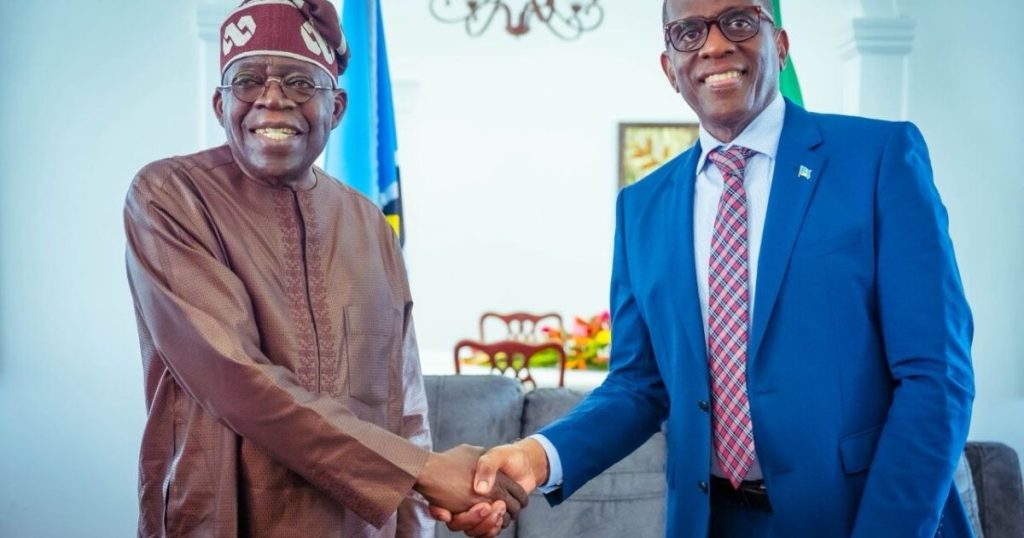The recent visit of Nigerian President Bola Tinubu to Saint Lucia, a Caribbean island nation, sparked controversy and criticism both in Nigeria and the host country. This backlash, however, drew sharp condemnation from Saint Lucian Prime Minister Philip Pierre, who labeled it “shameful” and attributed it to a deeply ingrained “self-hate” stemming from the historical legacy of slavery. Pierre’s remarks came during his address commemorating Emancipation Day, a significant holiday in Saint Lucia marking the abolition of slavery in the British Caribbean. This context imbued his words with a powerful resonance, connecting the criticism of an African leader to the enduring psychological scars of colonialism.
In Nigeria, the criticism focused on the timing of President Tinubu’s visit, which coincided with a devastating flood in Minna, Niger State, that claimed over 200 lives. Critics questioned the propriety of the trip, arguing that the President’s attention and resources should have been directed towards the domestic disaster. This perspective highlights a tension between international diplomacy and domestic priorities, with some Nigerians perceiving the visit as a misplaced allocation of resources during a time of national crisis. The optics of the President engaging in international travel while a significant portion of the population grappled with a natural disaster fuelled public discontent.
Within Saint Lucia, the opposition parties and various commentators raised concerns about the financial burden of hosting the Nigerian President. Questions were raised about the cost of the visit, the disruption caused by temporary airport closures, and the tangible benefits derived from any bilateral agreements that may have resulted from the visit. This skepticism reflects a common concern in smaller nations regarding the costs and benefits associated with hosting high-profile international visits. The opposition’s focus on financial accountability aimed to scrutinize the government’s expenditure and ensure transparency in dealings with foreign leaders.
Prime Minister Pierre, however, vehemently rejected these criticisms, framing them as a manifestation of the lingering psychological impact of colonialism. He argued that the negativity directed towards President Tinubu was indicative of a deeply ingrained prejudice against African leadership, a prejudice rooted in the historical dehumanization of African people. This interpretation reframes the criticism not as legitimate political discourse but as a manifestation of internalized racism, a legacy of centuries of subjugation. By linking the criticism of Tinubu to the broader historical context of slavery and colonialism, Pierre sought to delegitimize the opposition’s arguments.
Pierre further asserted that the criticism was politically motivated, suggesting that the opposition parties were exploiting the situation for political gain. He contrasted the reception given to President Tinubu with the hypothetical reception of a leader from a different region, implying that the negativity was specifically directed at Tinubu because of his African heritage. This argument aimed to expose a double standard in the treatment of visiting dignitaries, suggesting that the criticism was fueled by prejudice rather than genuine policy concerns. Pierre’s forceful defense of Tinubu solidified his government’s commitment to fostering stronger ties with Nigeria and demonstrated a Pan-Africanist stance.
The Emancipation Day address served as a platform for Prime Minister Pierre to articulate his perspective on the controversy surrounding President Tinubu’s visit. By framing the criticism within the larger historical context of slavery and colonialism, he sought to expose the insidious nature of prejudice and reaffirm Saint Lucia’s commitment to solidarity with the African diaspora. The strong language used by Pierre underscores the emotional weight of the issue and reflects his government’s determination to challenge what he perceives as deeply ingrained biases against African leadership. The incident highlights the complex interplay of domestic politics, international relations, and the enduring legacy of colonialism in shaping public discourse.


